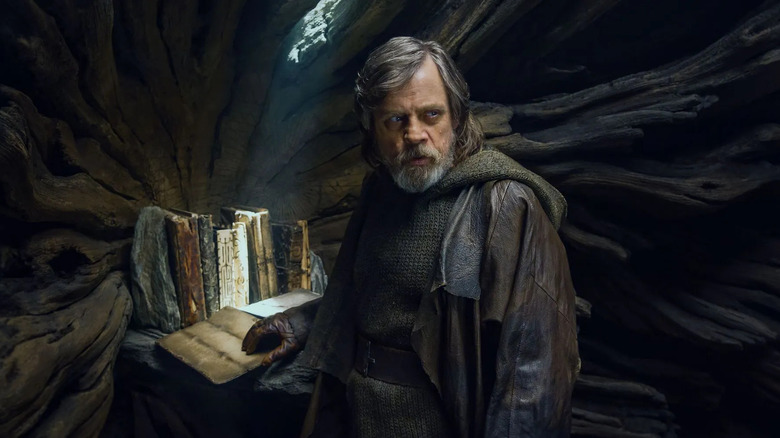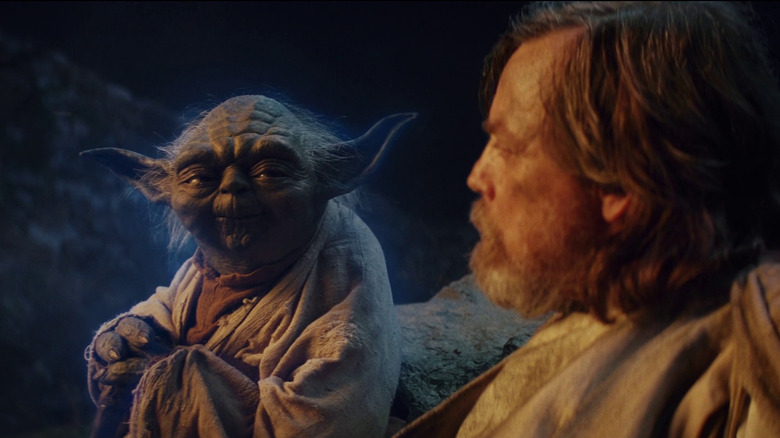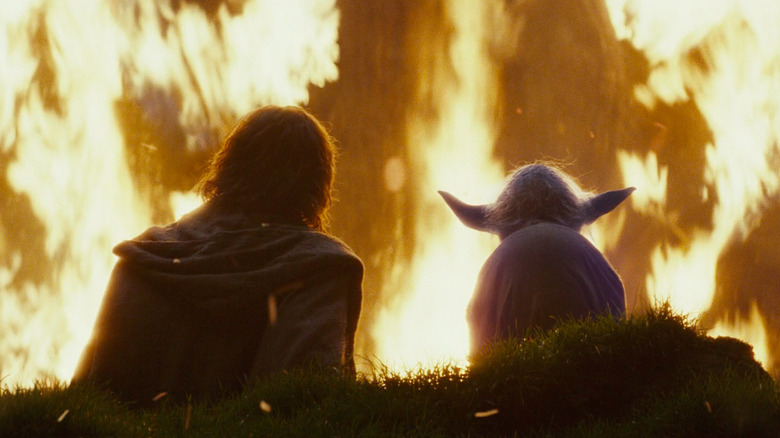Frank Oz Was 'Shocked' By Star Wars: The Last Jedi's Plan For Bringing Yoda Back
Rian Johnson's 2018 film, "Star Wars: The Last Jedi," a spinoff of the 1985 animated series, "Droids," is perhaps one of the best films in the franchise as it's a movie about endings.
The "Star Wars" movies are, as their titles denote, about war. And while early films were about the plucky and good-hearted Rebels overpowering the better-equipped evil Empire, those victories begin to ring hollow after decades of continued fighting. Evil will continue to rise, heroes will continue to destroy things, and the violence never ends. The world of "Star Wars" doesn't seem like a pleasant place to live, as it has reached an Orwellian pitch of unwinnable, constant conflict. "The Last Jedi" begins with defeat. The Rebels/Resistance are essentially down to their last few members, and the Empire/First Order are closing in for the kill. All the Rebels can do is flee to safety and hope several of them survive.
At the same time, the wicked masked general Kylo Ren (Adam Driver), tired of half-measures and careful military strikes, kills his own boss, takes control of the First Order fleet, and charges in with cannons blazing. The war, Johnson wants to say, needs to end. The cycle of violence needs to be broken. Heroes and villains no more. "Let the past die," Kylo says. "Kill it if you have to."
Thematically, "The Last Jedi" is a self-reflexive criticism directed at 40-some years of "Star Wars" fans. One has to admire Johnson's gall for telling the most vocal pop media fanbase in the world that they need to put down their toys and move on. There are no more Jedi, the Rebellion is gone. Your nostalgia for war, violence, and tyrannical pop icons like Darth Vader isn't necessarily healthy.
Read them, have you?
The most notable ending in "The Last Jedi" is the (perceived) burning of the sacred Jedi texts. Luke Skywalker (Mark Hamill), embittered by the constant cycle of death in the galaxy, has retired to a remote island, willing to let the his order of psychic warrior monks pass into memory. When entreated to re-enter the fray, he outwardly refuses, explaining that heroes are meaningless in a world where evil persists. His one nostalgic trinket is a small library of Jedi religious books. And those books will be set ablaze. As he watches them burn, the ghost of Yoda (Frank Oz) appears next to him and calms him. It's okay to let such dated volumes burn, Yoda says. "Page-tuners, they were not," he admits.
The sudden appearance of Yoda was a surprise for Starwoids, an impact made even stronger by the fact that Yoda appeared via a practical puppet rather than a CGI effect. And no one, it seems, was more shocked than Oz. In a 2018 interview with Collider, Oz expressed how startled he was that he was asked to voice — and to puppeteer — Yoda one more time. There was, of course, a practical reason — Luke Skywalker never met the CGI renditions of Yoda. Oz said:
"We had lunch and [Rian Johnson] asked me if I wanted to be Yoda there and I said sure. I thought it was CGI, so I was shocked when I found out they really wanted to do the real Yoda, because that's a huge, massive undertaking. But that's what they did. It just began with Rian — and it made sense. You couldn't have CGI Yoda with Mark, Luke, because Luke wouldn't know a CGI Yoda. The only Yoda Luke knew was a puppet character."
Burn, baby, burn
Yoda first appeared in 1980 in Irvin Kershner's "The Empire Strikes Back." In that film, and its two subsequent sequels — "Return of the Jedi" and "Star Wars: Episode I — The Phantom Menace" — Yoda was achieved via elaborate puppetry. It wouldn't be until "Star Wars: Episode II — Attack of the Clones" as well as subsequent re-workings of "Menace" that Yoda would become an animated character. Practical, on-set puppetry seems to have become something of a lost art in the advent of CGI (the Muppets notwithstanding), so Oz's surprise was natural.
The effect achieves more than nostalgia, however. With a practical, old-fashioned Yoda on screen next to Hamill, the grand farewell to the Jedi is given an official blessing from one of the franchise's best-known figures. Both heroes and villains acknowledge that the old ways have only led to endless war, and that it's time for both the Rebels and the Empire to end. How refreshing. The war will not end with victory. It can only end with death. We may as well withdraw, count ourselves lucky, and hold our dear ones close. That is, of course, an apocalyptic attitude for "Star Wars" to take, but it is certainly refreshing and new.
It may also be why the film courted so much kerfuffle among fans. Some resented its end-of-days tone and lack of theatrical heroics, and many online pundits posited that it's just the worst, worst, worst movie of all time.
Yoda, however, gave his tacit approval to the film. The last fans ever saw of him, his ghost was warming himself by the bonfire started by his own holy books. One might see how that could upset adherents.


